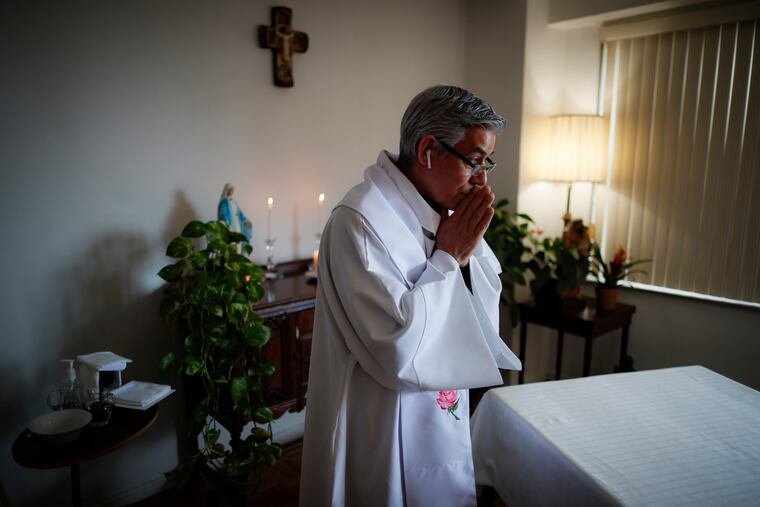Rift between White House and CDC delays guidance for reopening houses of worship
There are no plans to issue guidance for religious institutions, according to three administration officials.

WASHINGTON — Guidance for reopening houses of worship amid the coronavirus pandemic has been put on hold after a battle between the Centers for Disease Control and Prevention and the White House, which was resistant to putting limits on religious institutions, according to administration officials.
The CDC this week issued a detailed road map for reopening schools, child-care facilities, restaurants and mass transit. On Tuesday night, the agency issued additional guidance in the form of "health considerations" for summer camps, including overnight camps, and youth sports organizations and colleges.
But there are currently no plans to issue guidance for religious institutions, according to three administration officials who spoke on the condition of anonymity to discuss policy decisions.
White House spokesman Judd Deere said President Donald Trump and "all Americans want to see their churches safely open again. Not only is it good for the community, it's their right under the Constitution to worship freely without government intrusion. The Trump administration will always protect that right and continue to partner with states to ensure congregations are properly protected as restrictions are responsibly eased."
A coronavirus outbreak at an Arkansas church that killed three and infected dozens, as well as recent church closures in states at the forefront of reopening efforts, are already challenging the wisdom of the CDC not issuing guidance, experts said.
The Arkansas outbreak, detailed in a CDC report this week, began after a pastor at the church and his wife attended church events over six days in early March and spread the virus to others. At least 34 of 92 attendees at church events became infected, including the three who died, all over the age of 65. An additional 26 infections and one death in the community were probably linked to contact with people infected at the church events, according to the report.
Public health experts said the lack of reopening guidance for religious institutions puts some of the most vulnerable at risk for contracting COVID-19, the disease caused by the novel coronavirus.
» READ MORE: Philly-area religious leaders adapt to reach their faithful as pandemic drags on
Worshipers tend to be older than the population at large and are among the most at risk from the virus, said Tara Smith, a professor of epidemiology at Kent State University.
"You're talking about that group that is really vulnerable to this virus, and those are the ones you don't have guidelines for and that you need to protect," she said.
Smith is helping a Cleveland-area church navigate the safest way to reopen. She and a graduate student have gone over every aspect of the church service, from "what the priests are doing, to getting people into the church, to taking the host," she said.
But "it should not be our responsibility" to guide the church if there are existing federal recommendations, Smith said. Any guidelines would be voluntary and intended to "keep people safe," she said. "You think that would be the responsibility of the government. Churches could choose what to implement. . . . It just is really frustrating to me that these have not been released."
CDC draft guidance on houses of worship was the subject of much internal debate at the White House last month. Some aides did not want any guidance for religious institutions. Others thought recommendations were too restrictive.
In the end, the decision to hold back reopening guidance for religious institutions came from some White House and coronavirus task force officials who did not want to alienate the faithful and believed that some of the proposals, such as limits on hymnals, the size of choirs or the passing of collection plates, were too restrictive, according to two administration officials.
Trump and Vice President Mike Pence have maintained close ties to conservative religious leaders during the shutdown, scheduling private calls and asking for support as they try to reopen the nation, the officials said.
Officials in Pence's office, the Office of Management and Budget and the Domestic Policy Council raised concerns about the guidelines for religious institutions, the officials said.
There were conversations about scaling back the guidelines, but after weeks of discussion, they were left out entirely, one of these officials said. At one point, officials discussed various religious groups and even called pastors and other religious leaders to see if they could shape the guidelines in accordance with "faith traditions," according to one senior administration official.
A draft CDC document that detailed reopening guidelines recommended that faith communities consider temporarily limiting community sharing of prayer books, hymnals and other worship materials; consider using a stationary collection box, the mail or electronic payment instead of shared collection trays or baskets; and avoid or consider suspending choir or musical ensembles during services.
About a third of Americans — 31 percent — attend religious services at least once a week, the Pew Research Center reported last fall, down from 37 percent a decade earlier.
Nancy Davidge, spokeswoman for the Episcopal Church, did not have immediate comment about the decision to hold back reopening guidance for congregations, or whether the denomination had lobbied the White House.
Chieko Noguchi, spokeswoman for the U.S. Conference of Catholic Bishops, said the prelates have not discussed the CDC guidelines' omission of churches. Asked whether the bishops had advocated a position on the guidelines with the White House, Noguchi declined to comment. The Catholic Church is the country's largest faith group.
Other denominations are offering general suggestions to congregations about reopening. The Southern Baptist Convention, the country’s second-largest faith group, issued a checklist May 7 through its public policy arm, the Ethics and Religious Liberty Commission. Item No. 1: “Identify reliable, local sources of information. . . . Choices must be made based on objective data, not subjective impressions.”